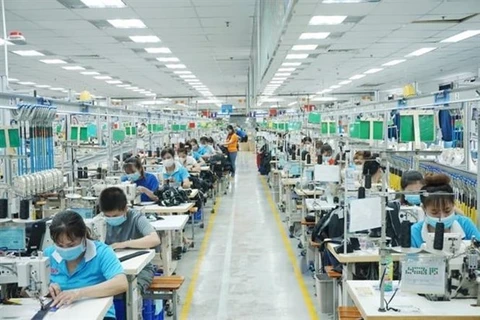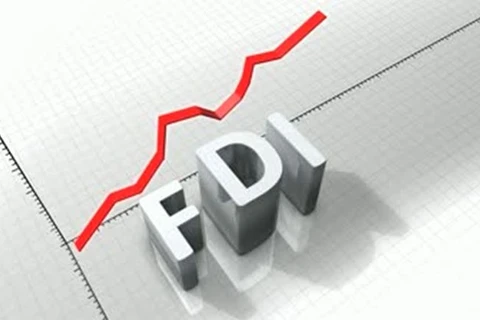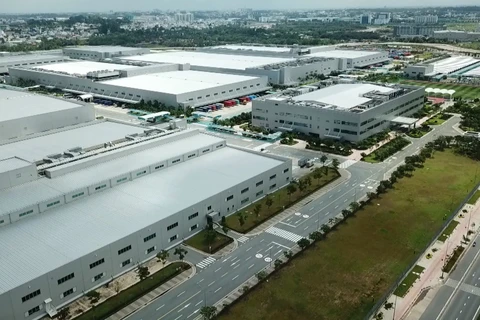Hanoi (VNA) – The Vietnam Association of Foreign Invested Enterprises (VAFIE) released an annual report on foreign investment in Vietnam last year at a meeting in Hanoi on May 10.
The report was made with the cooperation of KPMG Vietnam that provides independent audit services and the support of the Foreign Investment Agency under the Ministry of Planning and Investment, Fiin Group and some economists, according to VAFIE Vice President Nguyen Anh Tuan.
The 250-page report, in both Vietnamese and English, is expected to be useful for policy-making agencies, research and training institutions, FDI firms and international investors, he said.
VAFIE President Nguyen Mai said foreign investment is the silver lining in Vietnam's economic picture amid the adverse impacts of the COVID-19 pandemic on the national and global economy.
He, however, pointed out outstanding problems during the attraction and use of FDI such as the modest number of high-tech projects from the US and Europe. Besides, contributions to the State budget of many FDI enterprises did not match their investment scale and the incentives they are entitled to. The structure of FDI in terms of regions and localities remains unbalanced, and too few businesses established research and development (R&D) centres.
Noting that the Politburo issued Resolution No. 50-NQ/TW dated August 20, 2019 on orientations to consolidate institutions and policies in order to raise the quality and efficiency of foreign investment by 2030, Mai said the VAFIE realised the need for a report on FDI in Vietnam, hence the release of the report.
According to VAFIE, since the National Assembly passed the Law on Foreign Investment in Vietnam in 1987, the foreign-invested economic sector has continuously developed, significantly contributing to national economic growth and growth model reform towards industrialisation and modernisation, accelerating Vietnam’s international economic integration and improving its position in the world.
The FDI sector now accounts for around 25 percent of total social investment, 55 percent of total industrial production value in Vietnam, and more than 70 percent of the country’s export revenue.
It has generated direct jobs for 4.6 million people or more than 7 percent of the country’s workforce, and indirectly created jobs for millions of others./.
The report was made with the cooperation of KPMG Vietnam that provides independent audit services and the support of the Foreign Investment Agency under the Ministry of Planning and Investment, Fiin Group and some economists, according to VAFIE Vice President Nguyen Anh Tuan.
The 250-page report, in both Vietnamese and English, is expected to be useful for policy-making agencies, research and training institutions, FDI firms and international investors, he said.
VAFIE President Nguyen Mai said foreign investment is the silver lining in Vietnam's economic picture amid the adverse impacts of the COVID-19 pandemic on the national and global economy.
He, however, pointed out outstanding problems during the attraction and use of FDI such as the modest number of high-tech projects from the US and Europe. Besides, contributions to the State budget of many FDI enterprises did not match their investment scale and the incentives they are entitled to. The structure of FDI in terms of regions and localities remains unbalanced, and too few businesses established research and development (R&D) centres.
Noting that the Politburo issued Resolution No. 50-NQ/TW dated August 20, 2019 on orientations to consolidate institutions and policies in order to raise the quality and efficiency of foreign investment by 2030, Mai said the VAFIE realised the need for a report on FDI in Vietnam, hence the release of the report.
According to VAFIE, since the National Assembly passed the Law on Foreign Investment in Vietnam in 1987, the foreign-invested economic sector has continuously developed, significantly contributing to national economic growth and growth model reform towards industrialisation and modernisation, accelerating Vietnam’s international economic integration and improving its position in the world.
The FDI sector now accounts for around 25 percent of total social investment, 55 percent of total industrial production value in Vietnam, and more than 70 percent of the country’s export revenue.
It has generated direct jobs for 4.6 million people or more than 7 percent of the country’s workforce, and indirectly created jobs for millions of others./.
VNA























